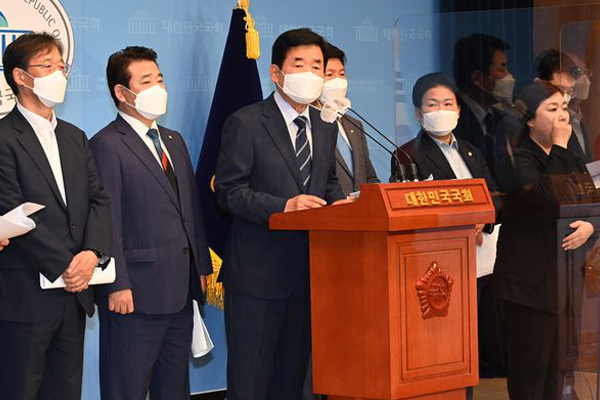With South Korea’s presidential election scheduled for less than nine months from now, the ruling Democratic Party (DP) is pushing for ambitious reform to real estate taxes and education as conservatives accuse it of monopolizing the National Assembly. The real estate market situation has been one of the key issues dragging down the approval ratings of President Moon Jae-in and the ruling party.
The first proposal is exempting sales for properties under 1.2 billion won ($1.06 million) from capital gain taxes, an increase from the current 900 million won. The exemption is only applied to those who own a single housing unit, and they have to meet several requirements. The controversial second proposal only imposes a comprehensive real estate tax on the top 2 percent of properties by government-assessed value. Currently, in the case of single apartments, the comprehensive real estate tax, which is a national tax separate from the property tax imposed by the local governments, applies to any property with an assessed value above 900 million won. For multiple home owners, the comprehensive real estate tax is applied when the combined assessed value exceeds 600 million won.
Revisions to the law are expected to be passed next month, considering the fact that the ruling party and other liberal leaning parties hold 180 seats out of 300 total in the National Assembly. If the amendment is passed, the number of households who have to pay comprehensive real estate tax will drop from 525,000 to 284,100, or down to those who own the top 2 percent most valuable properties. One of the main reasons that the DP is pushing for this amendment is because the party realized it must do better in terms of the real estate market and reduce tax burdens in order to win the next presidential election.
However, the amendment is causing controversy because defining “the top 2 percent” is very complicated, as prices fluctuate all the time. Currently, people who own expensive properties know in advance that they will have to pay comprehensive real estate taxes since it is based on an absolute number, but if the new law goes into effect, they will not know until the government announces the official values of properties every year during tax season.
Some experts and conservative politicians argue that this amendment will cause more confusion to the market and could be interpreted as dividing people between the bottom 98 percent and top 2 percent. Some also question how the government is going to persuade people about the legitimacy and fairness of the policy when those in the top “2 percent” have to pay taxes, while those in the top “2.0001 percent” will be exempt from taxes.
“If they set it based on the top 2 percent, there will be people who have to pay taxes for their properties even if their values go down,” Shim Kyo-eon, professor at Konkuk University, told the Chosun Ilbo newspaper. “They did not provide any explanation of the legal grounds for setting the requirement at the top 2 percent which is causing confusion among people.”
Yoo Seung-min, a former lawmaker of the main opposition People Power Party (PPP) and a prominent potential presidential candidate, said that this kind of taxation cannot be found anywhere else in the world.
“The tax rate should be decided by lawfully countable figures such as income, assets, and price, but they are trying to force the top 2 percent of people to pay taxes regardless of value changes in their properties,” said Yoo. “This is simply dividing people through taxation.”
Earlier this month, the DP unilaterally passed another controversial law aimed at establishing a “National Education Commission.” The commission will be comprised of 21 people, of which 9 will be recommended by the National Assembly. This will be based on the number of seats each party holds in the National Assembly. The president will appoint 5 people. It is expected that the majority of the members will be in favor of the current administration.
The commission’s goal is to lay out a long-term education policy to avoid having it be affected whenever the administration changes. Conservatives worry that this newly-established commission will be comprised of people from the current administration and will have a continuous impact on the next administration, since the members’ term will be three years and they can be reappointed for one more term.
According to the Maeil Business newspaper, 80 percent of the 403 laws passed in the 21st National Assembly, which started a year ago, were introduced by the DP members.
This figure is much higher than previous National Assembly sessions, even those in which one party had a clear majority. During the 20th National Assembly, the DP also held a majority of seats but it accounted for only 45.8 percent of the total bills passed. During the 19th National Assembly, the conservative Saenuri Party held a majority but accounted for 49.2 percent of total bills.
During the first year of the 21st National Assembly, only 73 bills, or 18.1 percent of the total, introduced by the PPP were passed. The figure is even lower than the 23.5 percent for the DP in the 18th National Assembly, when it held only 81 seats. The PPP currently has 102 seats in the assembly.
Conservatives argue that the ruling party is monopolizing legislative procedures and passing various laws to appease the presidential Blue House. The DP, however, continues to say that it needs to aggressively pass laws to reform society, as people have chosen them to accomplish this goal. The DP won 49.9 percent of votes in the last general election compared to the 41.5 percent won by the conservative party. But the DP and other liberal parties account for 60 percent of the seats – and have a ‘super-majority’ that allows them to pass laws regardless of opposition challenges.



